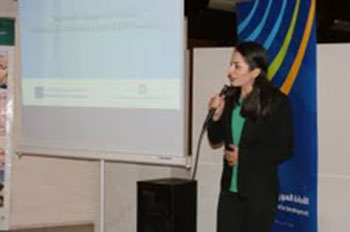Since rebuilding individual is essential, as many as 22 shelters in Damascus province see three new initiatives concentrate on educating affected children, who are temporary living with their families in the shelters.
The goals and mechanism of implementing each initiative were elaborated in a symposium held on April,2nd , 2013 in IT plaza center in the capital.
The Syria Trust for Development in cooperation with the Aga Khan Trust for Culture organized the symposium which mainly aimed to look for new partners.
“Such initiatives are very important in the current circumstance Syria is going through and the door is open to all those who determine to offer financial, logistic and humanitarian aid to affected children”, the press release read.
Volunteers from the Trust, which supervises the 22 shelters, gave detailed information about steps of implementing each initiative.
“Return to school”
Julian Haddad, a volunteer, said: “the first initiative entitled ‘return to school’ seeks to remove obstacles that prevent children from going to school and give private lessons to them to continue their study.”
He noted that a recent survey on dropout rate in shelters has revealed that there are 665 school dropouts. “We are working to return them to school as soon as possible,” Haddad added.
“Reading books”
Another volunteer, Roba Saboneh, talked about the second initiative called “Hekayati M’khabbyeh” [slang means ‘my story is hidden’], which focuses on reading stories in an interactive method and establishing a library.
“Integration through art works”
However, the third initiative entitled “integration between children living in shelters and those living in hosting societies” includes several activities such as music, drawing and sculpture.
Shadi Sarweh, who is specialized in jam-session, is working in the third initiative and preparing for a concert to be performed by children from both shelters and hosting societies.
He trains dozens of children to have a choir team.
As for drawing and sculpture activities, Masa al-Mosseli said that at least 75 children are being trained to hold an exhibition for their works.
Revenues of the concert and exhibition will go towards supporting affected families.
 “Continuity of initiatives”
“Continuity of initiatives”
Coordinator of the South Region in the Trust, Rana Mas’oud, told the Syria Times, that the three initiatives launched in mid-February in cooperation with Education Ministry and Damascus governorate.
“Since the opening of shelters, the Trust has launched other development and aid initiatives in cooperation with several local organizations,” Mas’oud said.
She clarified that the UN High Commissioner for Refugees funded the initiatives in the first stage. “But we want to guarantee the continuity of the initiatives after the UNHCR stops its fund… Other partners are communicating with us to fund ongoing initiatives.”
“Yes, you can help”
For his part, the AKDN Communication Assistant, Hasan Saifo, said in a speech that everyone is able to take part in helping affected people in Syria.
“The initiatives are not magic solutions to all problems. They are just first steps to go forward,” Saifo added.
The Syria Times interviewed two attendees to know their opinion about the initiatives.
“Friendly touch”
Reem Asaad, from ‘Lamsat Dafa’ initiative [slang means : warm touch], underscored importance of development initiatives in the current situation, noting that “Lamsat Dafa” took part in distributing bags and stationery in several shelters in cooperation with the Trust.
The “Lamsat Dafa” initiative, which was found in December 2011, includes 23 Syrian women and has several aid and development activities.
Nowadays, the ” Lamsat Dafa” initiative , the Trust and Education Ministry are working in a project called “Madrasti Ahla” [ a slang mean ‘my school is more beautiful’] in 6 schools in Mhajreen area in Damascus.
Wafaa Aqel from” Lamsat Dafa” initiative told us: “We have amazed by the students’ creative ideas to make schools more beautiful.”
All projects are being defined according to field visits and surveys.
In all, the noble-goal initiatives which basically depend on volunteers will, hopefully, alleviate the affected families’ suffering from the two-year old crisis in the homeland.
Basma Qaddour

